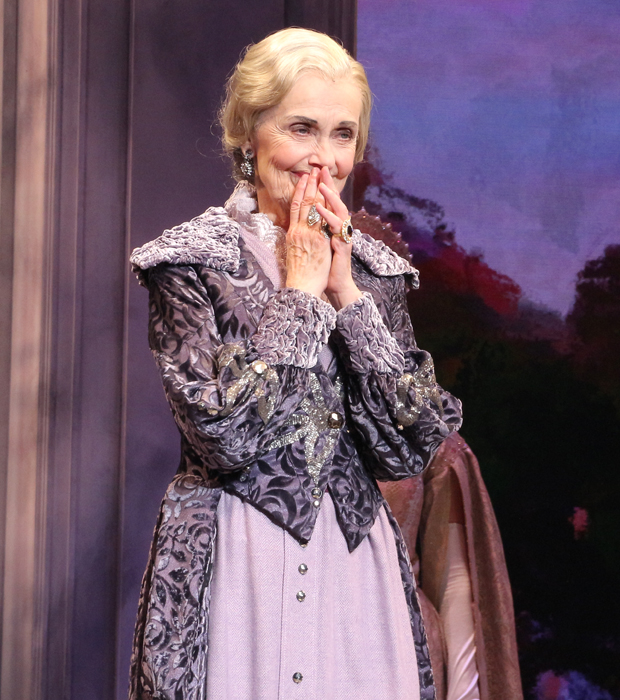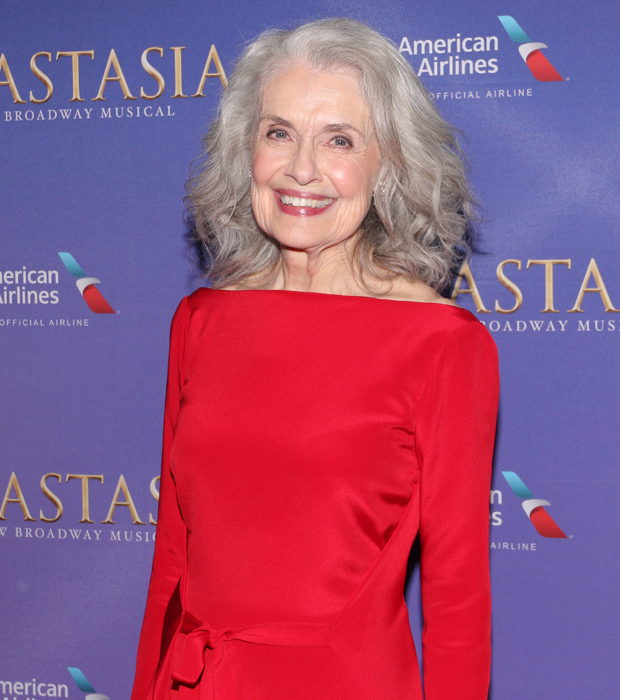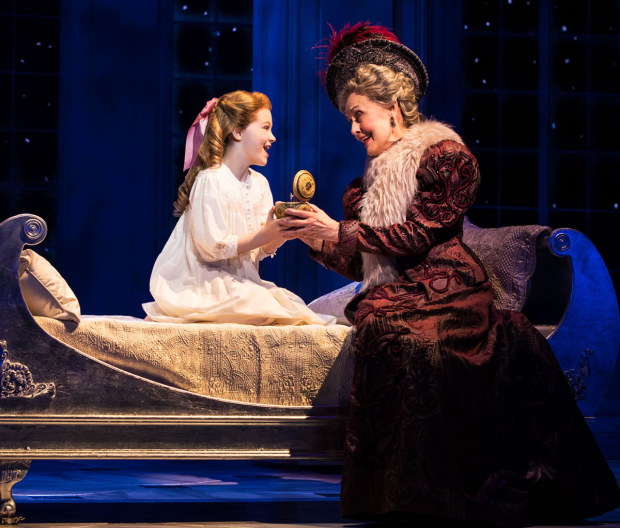32 Years After Her First Tony Nod, Anastasia's Mary Beth Peil Finally Feels at Home
The beloved stage veteran reflects on a Broadway career that all started with Yul Brynner and a classic musical.

(© David Gordon)
The night before the Tony nominations were announced, Mary Beth Peil had a bad dream. "I had a nightmare that I was back in the opera world," she remembers, "and I was singing something that I didn't know, and I had the wrong music, and it was a competition. Oh, it was ridiculous. When I woke up in the morning, I was relieved that I was in real life."
Her morning was sweetened with the news that she had been named a 2017 Tony nominee for her performance as the Dowager Empress in Anastasia, the new Lynn Ahrens, Stephen Flaherty, and Terrence McNally musical inspired by the 1997 animated film. "I had breakfast in one room, and my daughter was in the other room watching the nominations, and then she started screaming and crying. And then I started screaming and crying. That was how I knew."
Peil plays down her Featured Actress in a Musical nod, simply calling it "very sweet" and "an extra bonus." But she also admits that she gets "very emotional" when she thinks about this particular instance of recognition. While she's already been nominated once before — 32 years ago — this one represents the culmination of her life's journey, which has unexpectedly taken her from the world of opera to the Great White Way, as well afforded her the long-desired chance for an experiential do-over.
A native of Davenport, Iowa, Peil started taking voice lessons as a high schooler. She says she was "steered" in the direction of opera: "My voice teacher felt that was what my voice wanted to be." She experienced the same thing at Northwestern, where she got into the opera program. At the time, Peil was pleased with the choice. "Opera was the perfect fusion of the arts," she notes. But she also knew that she possessed some pretty good acting chops. "I think I was such a good actor that I fooled a lot of people into thinking that I was a better singer than I really was."
Still, she "loved the art form, and the training. I loved everything about it except being a slave to perfection." As she looks back, she realizes, most crucially, that "I was never really in love with my voice, the actual voice. The opera singers that I know, who are the happiest and most successful, truly, truly love the sound of their voice. I could never…" she says, her voice trailing off. "It wasn't me."
Peil's last operatic role came in 1982, when she played Miss Alma in Lee Hoiby's musical rendering of Tennessee Williams' Summer and Smoke (she originated the role in 1971, and the final iteration was broadcast on PBS). The next year, she played the title role in Cole Porter's musical Kiss Me, Kate for Minnesota Opera.
"They decided I would be the perfect Kate, because I could sing it, with all the high notes, but I could also do the acting. I went out there thinking I would totally ruin my voice forever, not just singing, but screaming that particular role eight hours a day. But it turned out just the opposite. I got stronger and stronger, and the light bulb went on. I'm an actor who can sing, not a singer who could act."

(© David Gordon)
At the age of 43, Peil returned to New York City and put the word out that she was shifting her career. At the same time, Yul Brynner was looking for a performer to take on the role of Anna Leonowens in a Los Angeles production of The King and I. Peil landed the part and joined the cast in August 1983. That September, on the same day that Brynner marked his 4,000th performance as the King of Siam, he was diagnosed with inoperable lung cancer. But the show must go on. They continued performing together, moving to Broadway in January 1985. Peil received her first Tony nomination, and the show ran through June of that year. Brynner died that October.
"I learned so much from him," says Peil, her voice filling with emotion. "He taught me so many things about stage craft and the business. He taught me how not to sing so much, which I didn't think you could do. He taught me the invaluable quality of stillness, of not feeling like you had to do something onstage, and how it would read to the back row of the mezzanine. The more I think about it, concentration was the biggest thing I learned. That you cannot concentrate too much. Towards the end, he was literally carried through the wings of the stage. To watch him every night, after 30 years of doing that part, on literally his last legs, concentrate over the pain and incapacity, was stunning."
In the years since making her debut in The King and I, Peil has racked up an impressive résumé on stage and screen: She played Antonio Banderas' mother in Nine, Solange in Follies (singing "Ah, Paris!"), and, earlier this season, Liev Schreiber's aunt in Les Liaisons Dangereuses. On television, she has been Michelle Williams' "Grams" on Dawson's Creek and Chris Noth's mother, Jackie, on The Good Wife, among many other appearances. Perplexingly, her only award to date is a 1994-95 Obie for her appearances in three off-Broadway shows that season.
Anastasia, with its operatic grandeur, synthesizes all of her career choices. "All the pieces come together for me, all the way to the costumes." It's also the chance for a major do-over.
"Thirty-two years ago, when I was nominated for King and I, I really didn't grasp what the Tonys were or what they meant," says Peil. "The night of the ceremony, I was struck by the theater community and the feeling of love and support across the board. I felt like an interloper, like a pretender. I didn’t know anybody and nobody knew me. I almost wanted to shrink in my seat thinking, 'This would be horrible if I got this. Everybody would probably boo me.' I said to myself, if by some miracle I ever get a chance to be back in the seat of being a nominee, I want to know that I belong in that room and that there are people rooting for me," she concludes, before a pregnant pause.
"And here I am. And I do."

(© Matthew Murphy)










